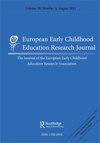How pandemics like COVID-19 change education in early childhood: the music practice and tendencies in Serbia
IF 1.8
4区 教育学
Q2 EDUCATION & EDUCATIONAL RESEARCH
European Early Childhood Education Research Journal
Pub Date : 2023-09-20
DOI:10.1080/1350293x.2023.2259640
引用次数: 0
Abstract
ABSTRACTThis paper explores whether a Serbia preschool institution is prepared for education during the pandemic. The research subject is nine kindergarten-preschool units where 140 teachers work with about 2500 children up to 6.5 years. We examined all teachers that work in preschool units. The study aims, for a case study of music education, to answer: Whether the COVID-19 pandemic affected the change in the educational work in the field of music in preschool; Can web-based applications and educational resources improve preschool music outcomes, especially during a pandemic; Would web applications and educational resources reduce financial costs; Would web applications and educational resources enhance parent-teacher communication. The findings show preschool teachers mostly use traditional offline educational techniques and tools but need more online learning tools, Web resources, and applications, especially when working remotely. They believe such resources can reduce financial costs and improve parent-teacher communication. The study found that the pandemic has forced changes in practice. However, according to teachers, these changes can enhance future post-pandemic practice thanks to web-based educational technologies that more closely connect all participants in early childhood education.KEYWORDS: Early childhood educationmusic education in preschoolteachers’ attitudeskindergarten teachersCOVID-19 AcknowledgmentThe Faculty of pedagogy, University of Niš, Serbia, fully supported this research.Disclosure statementNo potential conflict of interest was reported by the author(s).Notes1 In Serbia, preschool and kindergarten are both included in the same institution. The institution usually covers all preschool and kindergarten units in the local area. One local unit is both − preschool and kindergarten. It is commonly called ‘kindergarten’.像COVID-19这样的大流行如何改变幼儿教育:塞尔维亚的音乐实践和趋势
摘要本文探讨了塞尔维亚一家学前教育机构是否为疫情期间的教育做好了准备。研究对象是9个幼儿园-学前教育单位,140名教师为大约2500名6.5岁以下的儿童提供服务。我们调查了所有在幼儿园工作的老师。本研究旨在以音乐教育为个案,回答:新冠肺炎疫情是否影响了学前音乐教育工作的变化;基于网络的应用程序和教育资源能否改善学龄前儿童的音乐效果,尤其是在大流行期间?网络应用和教育资源会降低财务成本吗?网络应用和教育资源会促进家长与教师的沟通吗?调查结果显示,幼儿教师大多使用传统的线下教育技术和工具,但需要更多的在线学习工具、网络资源和应用程序,尤其是在远程工作时。他们认为这些资源可以降低财务成本,改善家长与教师的沟通。该研究发现,大流行迫使人们改变了做法。然而,教师们认为,由于基于网络的教育技术使幼儿教育的所有参与者更紧密地联系在一起,这些变化可以加强未来大流行后的实践。关键词:幼儿教育;学前教师对音乐教育的态度;幼儿园教师;披露声明作者未报告潜在的利益冲突。注1在塞尔维亚,学前班和幼儿园都包括在同一机构内。该机构通常涵盖当地所有学前班和幼儿园单位。一个地方单位同时是学前班和幼儿园。它通常被称为“幼儿园”。
本文章由计算机程序翻译,如有差异,请以英文原文为准。
求助全文
约1分钟内获得全文
求助全文
来源期刊

European Early Childhood Education Research Journal
EDUCATION & EDUCATIONAL RESEARCH-
CiteScore
4.20
自引率
8.70%
发文量
70
期刊介绍:
The European Early Childhood Education Research Journal (EECERJ) is the publication of the European Early Childhood Education Research Association (EECERA), an international organisation dedicated to the promotion and dissemination of research in Early Childhood Education throughout Europe and beyond. CREC is the UK base for the European Early Childhood Research Association. EECERA welcomes and encourages membership and contributions from across the world to share and participate in its European perspective. EECERJ aims to provide a forum for the publication of original research in early childhood education in Europe.
 求助内容:
求助内容: 应助结果提醒方式:
应助结果提醒方式:


